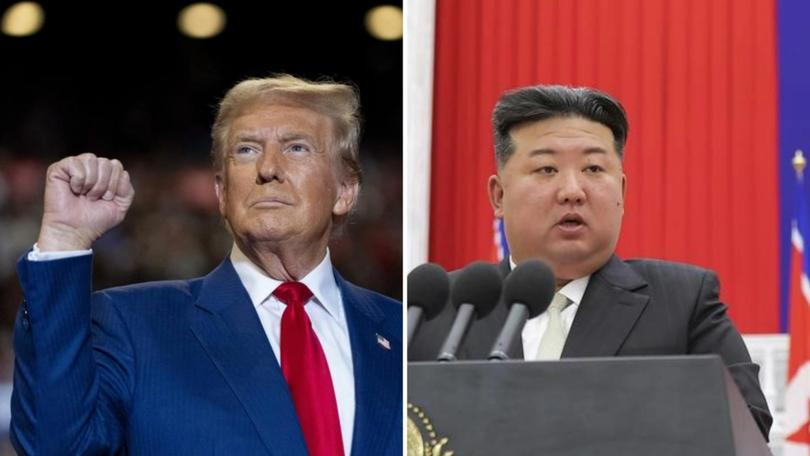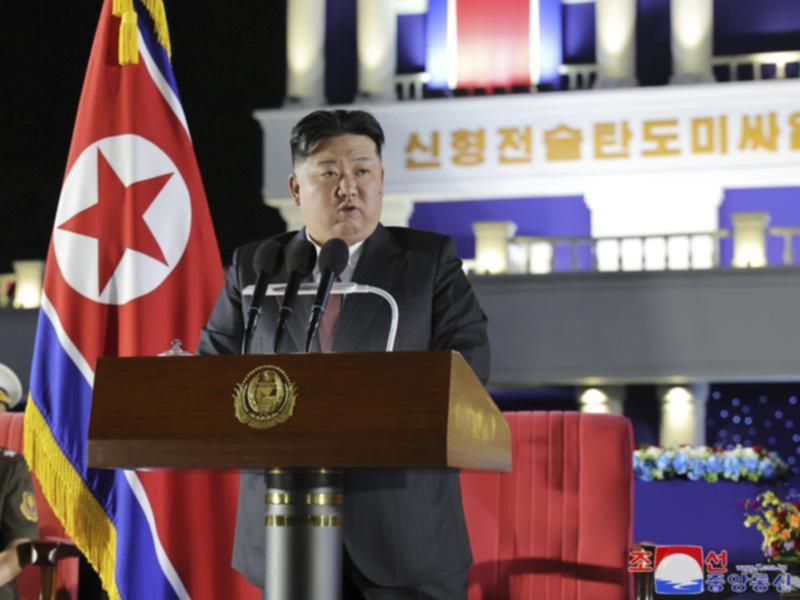THE NEW YORK TIMES: Will Donald Trump rekindle a bromance with Kim Jong Un? South Koreans worry
Donald Trump has described the United States’ alliance with South Korea as a terrible bargain. But when mentioning Kim Jong Un, the leader of North Korea, he talked as if Kim were a long-lost friend.

SEOUL, South Korea — During his 2024 election campaign, Donald Trump described the United States’ alliance with South Korea as a terrible bargain for his country, accusing the Asian ally of not paying enough for the 28,500 U.S. troops stationed on its soil.
But when he mentioned Kim Jong Un, the leader of North Korea who has threatened to use nuclear weapons against the South, he talked as if Kim were a long-lost friend.
“It’s nice to get along when somebody has a lot of nuclear weapons or otherwise,” Trump said about Kim in July. “He’d like to see me back, too. I think he misses me, if you want to know the truth.”
Sign up to The Nightly's newsletters.
Get the first look at the digital newspaper, curated daily stories and breaking headlines delivered to your inbox.
By continuing you agree to our Terms and Privacy Policy.South Koreans are bracing themselves for Trump’s return to the White House with growing anxiety and uncertainty, as it raises the specter of the diplomatic roller coaster ride on the Korean Peninsula they endured during his first term.
Some fear that Trump will once again threaten to withdraw U.S. troops from South Korea unless it greatly increases its share of the costs, and that he will rekindle an ill-calculated diplomatic bromance with Kim.
“South Korea-U.S. relations will sail into a storm,” said Lee Byong-chul, a North Korea expert at the Institute for Far Eastern Studies in Seoul. “But we will likely see Kim Jong Un and Trump exchanging love letters again.”
North Korea has not reacted to Trump’s election. But analysts say Kim may see it as an opportunity to restart negotiations with the United States — with more bargaining power than he wielded when he first met Trump. Between then and now, North Korea’s nuclear and missile abilities have expanded significantly, allowing Kim to demand a higher price tag for making a concession on his nuclear program, the analysts said.
Since 2019, Kim has developed and tested more nuclear-capable missiles. He signed a mutual defense treaty with Russia in June. In September, North Korea for the first time unveiled a weapons-grade uranium-manufacturing site, where Kim vowed to produce “exponentially” more nuclear weapons.
After launching a new Hwasong-19 intercontinental ballistic missile last week, Kim said North Korea would “never change its line of bolstering up its nuclear forces.” South Korean officials warned that Kim may even conduct his country’s seventh nuclear test, which would be its first since 2017, to further elevate his leverage before negotiating with Trump.
Trump will most likely begin his second term with more political clout, too, after a big election win and with the Republicans on track to control both chambers of Congress, although he also faces foreign policy challenges including the wars in the Middle East and Ukraine. If he takes on North Korea, he will confront a decades-old riddle that successive American governments have tried to solve but failed. The last time he did, he veered between applying pressure and unleashing insults against Kim to more friendly, toned, one-on-one diplomacy, but he, too, failed.
If Kim and Trump were to restart talks, Kim would be widely expected to try to persuade Trump to ease sanctions and reduce the American military footprint on the peninsula in return for freezing North Korea’s long-range ballistic missile program and limiting — but not eliminating — its nuclear arsenal. For decades, the United States and its allies have pushed for a “complete, verifiable and irreversible dismantlement” of North Korea’s nuclear program.
“Kim Jong Un wants the United States to accept his nuclear weapons as a fait accompli and engage him in arms-reduction talks,” said Cheon Seong-whun, a former head of the Seoul-based Korea Institute for National Unification. “If such negotiation happens, it will cause shock and confusion in South Korea because it will be tantamount to recognizing North Korea as a nuclear weapons power.”

Trump and Kim spent much of 2017 exchanging personal insults and threats of nuclear war. Trump threatened to rain down “fire and fury” and “totally destroy” North Korea in the aftermath of its nuclear and long-range ballistic missile tests. He sent long-range bombers and aircraft carriers toward the peninsula to warn Kim, whom he referred to as the “little Rocket Man.” Kim called Trump a “mentally deranged U.S. dotard.”
Then they did an about-face, meeting in Singapore in 2018 in the first summit meeting between their nations. Trump facilitated his diplomacy with Kim by cancelling or scaling down joint military drills with South Korea, which had long symbolized the alliance’s will to deter North Korea and, more recently, China. Trump later said he and the North Korean dictator “fell in love.”
South Koreans had watched their meetings with both scepticism and hope, many wishing that the two leaders would negotiate a history-making peace deal on the peninsula, one of the world’s most enduring flashpoints since the 1950-53 Korean War ended with a truce and left the two sides technically at war. But negotiations between Trump and Kim fell apart in 2019, as they disagreed on how far North Korea should roll back its nuclear program in return for relief from international sanctions that Kim badly needed for economic development.
Kim has since found a new way, rapidly expanding his nuclear arsenal while cutting off all dialogue with the United States and South Korea. He also forged a new alliance with Russia, shipping both weapons and troops to aid in its war against Ukraine.
Since he took office in 2022, South Korean President Yoon Suk Yeol has worked with the Biden administration to restore and expand the joint military drills involving the allies. He will find his legacy at risk if Trump again diminishes those military exercises, which he has called “very expensive,” and resumes diplomacy with Kim at a time when North Korea has rejected South Korea as a dialogue partner.
When Trump talked with Yoon on the phone Thursday, he showed “interest in North Korea,” kicking off discussions of the country, including its recent missile tests and its offensive of “trash balloons” sent into South Korea, Yoon said. The two leaders agreed to meet soon, he added.
South Korea’s leader said U.S. politicians told him that he and Trump may share “chemistry,” perhaps because both entered politics after spending a lifetime in other fields.
Trump and Kim appeared to have such chemistry when they first met in Singapore, reveling in the global publicity their rare meeting generated. But their second summit, in 2019 in Hanoi, Vietnam, proved an extraordinary embarrassment for Kim, whose propagandists had built up expectations at home that he would achieve a monumental deal with the United States. Instead, he risked looking weak by returning empty-handed.
Although the two leaders met a third time — when Trump became the first sitting U.S. president to set foot in North Korea by briefly crossing the demarcation line with the South — the dialogue petered out and Kim later declared he had no interest in further talks.
“This time, he will be more careful, trying to set strict preconditions for meetings, in order not to repeat the humiliation of the first round of negotiations with Trump,” said Park Won-gon, a political scientist at Ewha Womans University in Seoul.
Complicating matters for South Korea and its leader is Trump’s tendency to see alliances in transactional terms. Trump has said that if he won the election, he would make South Korea pay $10 billion for keeping U.S. troops in South Korea. It currently pays a little over $1 billion, having signed an agreement with the Biden administration to increase its annual contribution to $1.13 billion by 2026.
“They have a money machine,” Trump told Bloomberg last month. “We protect them from North Korea and from other people.”
Trump could make more South Koreans wonder how much and for how long they can rely on the alliance for their defense and ask whether they should also build nuclear weapons to deter North Korea. About 70% of South Koreans already believed that their country should have its own nuclear weapons, according to surveys.
“The more likely Trump’s reelection, the more likely our fears will be realized that we will confront nuclear-armed North Korea alone and without nuclear weapons,” Park In-kook, South Korea’s former ambassador to the United Nations, said during a forum in July.
Yoon once warmed up to the idea of arming South Korea with nuclear weapons. But he shelved that option last year when he and President Joe Biden signed the “Washington Declaration,” in which South Korea recommitted itself to nonproliferation while the United States reaffirmed its promise to protect its ally with all its military resources, including nuclear.
“Trump will turn the Washington Declaration into a piece of waste paper,” said Cheong Seong-chang, a senior analyst at the Sejong Institute in South Korea. “South Korea will have to have a fundamental review of its diplomatic and security policies. And we will see more South Koreans supporting nuclear armament.”
This article originally appeared in The New York Times.
© 2024 The New York Times Company
Originally published on The New York Times
